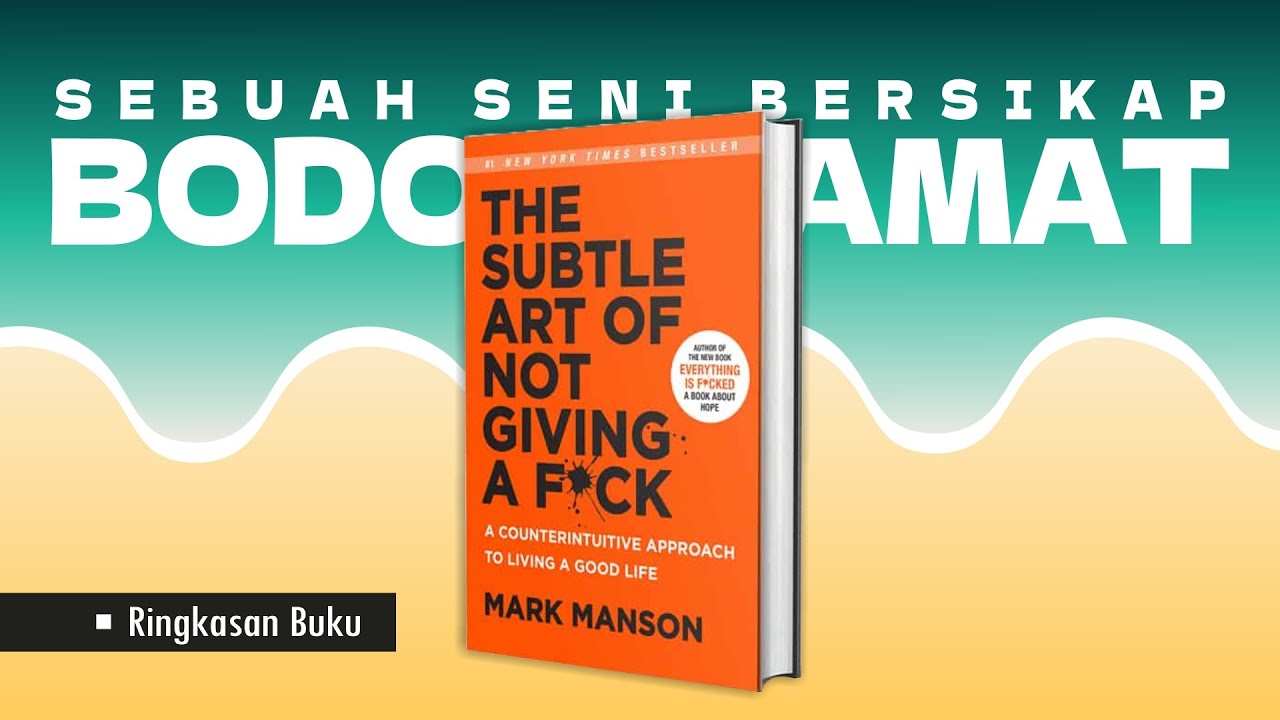The Subtle Art of Not Giving a F*ck - Summarized by the Author
Summary
TLDRIn *The Subtle Art of Not Giving a F*ck*, Mark Manson emphasizes the importance of embracing pain and responsibility to live a meaningful life. He argues that we should choose our struggles wisely, take responsibility for our actions (even when things aren't our fault), and embrace failure as a stepping stone for growth. Manson stresses the value of uncertainty, saying no to things that don’t align with our values, and using the contemplation of death to clarify what truly matters. The book advocates living authentically and focusing on what’s most important to avoid wasting time on superficial pursuits.
Takeaways
- 😀 Life is full of uncertainty, and embracing it can lead to a more fulfilling existence.
- 😀 Personal responsibility is crucial for taking control of one's life, especially when faced with challenges and failures.
- 😀 Humor can be a powerful tool to cope with the difficult aspects of life, including death and the unknown.
- 😀 Relationships with others can serve as both a source of strength and vulnerability, depending on how they are managed.
- 😀 Success and failure are not absolute; they are part of a larger journey that requires resilience and adaptation.
- 😀 Self-reflection is important to understand one's choices and how they impact both the individual and those around them.
- 😀 The inevitability of death is a constant reminder to live authentically and focus on what truly matters.
- 😀 Growth often comes from discomfort and facing challenges head-on, as opposed to avoiding them.
- 😀 Accepting the unpredictability of life can free people from the burden of needing to have everything planned or controlled.
- 😀 Learning to laugh at one's own mistakes or misfortune can foster a sense of humility and prevent excessive self-criticism.
Q & A
What is the main theme of Mark Manson's video?
-The main theme of Mark Manson's video is to provide straightforward life advice, focusing on accepting and embracing life's difficulties, rather than trying to avoid them. He encourages viewers to confront challenges and take responsibility for their actions.
Why does Mark Manson say it's important to acknowledge that life is difficult?
-Manson argues that acknowledging the inherent difficulties in life helps people develop resilience and a healthier mindset. By accepting challenges, individuals are less likely to be overwhelmed by adversity and can focus on how to effectively handle it.
What does Mark Manson mean by 'the subtle art of not giving a f*ck'?
-By 'the subtle art of not giving a f*ck,' Manson refers to the idea that individuals should selectively care about certain things in life, instead of trying to please everyone or fix every problem. It involves prioritizing what truly matters and letting go of superficial concerns.
How does Manson suggest people deal with their emotions?
-Manson suggests that instead of suppressing or ignoring emotions, people should acknowledge them and understand their role in guiding decisions. Emotions should be treated as signals, not as obstacles or reasons for avoidance.
What role does personal responsibility play in Manson's philosophy?
-Personal responsibility is a cornerstone of Manson's philosophy. He believes that individuals must take full responsibility for their choices, even in situations where they don't have complete control. This empowers them to make meaningful changes in their lives.
Why does Mark Manson advocate for embracing failure?
-Manson believes that failure is a natural part of growth and that embracing failure allows people to learn, adapt, and improve. Instead of fearing failure, people should use it as an opportunity to grow and refine their approach to challenges.
What is Manson's stance on modern societal expectations?
-Manson is critical of modern societal expectations, particularly the pressure to constantly succeed, be happy, and be perfect. He emphasizes that such pressures can be overwhelming and unrealistic, and encourages people to question these standards and focus on what truly matters to them.
How does Manson view success?
-Manson views success not in terms of external validation or societal standards, but in terms of personal growth and living in alignment with one's values. True success comes from choosing meaningful struggles and being committed to the process, regardless of the outcome.
What does Manson mean by 'the importance of saying no'?
-Manson stresses the importance of saying 'no' to things that do not align with one's values or priorities. By setting boundaries and saying no, individuals can preserve their time and energy for the things that truly matter.
How does Mark Manson suggest people approach their goals?
-Manson advises that people should approach their goals with a sense of realism and focus on the process, rather than obsessing over the end result. He encourages individuals to set goals that align with their core values and to commit to the effort required to achieve them, without expecting perfection.
Outlines

Cette section est réservée aux utilisateurs payants. Améliorez votre compte pour accéder à cette section.
Améliorer maintenantMindmap

Cette section est réservée aux utilisateurs payants. Améliorez votre compte pour accéder à cette section.
Améliorer maintenantKeywords

Cette section est réservée aux utilisateurs payants. Améliorez votre compte pour accéder à cette section.
Améliorer maintenantHighlights

Cette section est réservée aux utilisateurs payants. Améliorez votre compte pour accéder à cette section.
Améliorer maintenantTranscripts

Cette section est réservée aux utilisateurs payants. Améliorez votre compte pour accéder à cette section.
Améliorer maintenantVoir Plus de Vidéos Connexes

كيف يمكن أن يقودك الإهتمام بكل شيء.. إلى لا شيء ! فنّ اللامبالاة

Bersikap BODO AMAT ala Mark Manson | Ringkasan Buku Audiobook

Kunci dari Kebahagiaan = Bersikap Bodo Amat?! Maudy Ayunda's Booklist

Comment s'en Foutre ? (9 Leçons - L'Art Subtil de s'en Foutre)

This Self Help Book is RUINING People...

The 11 Laws of Maturity
5.0 / 5 (0 votes)
